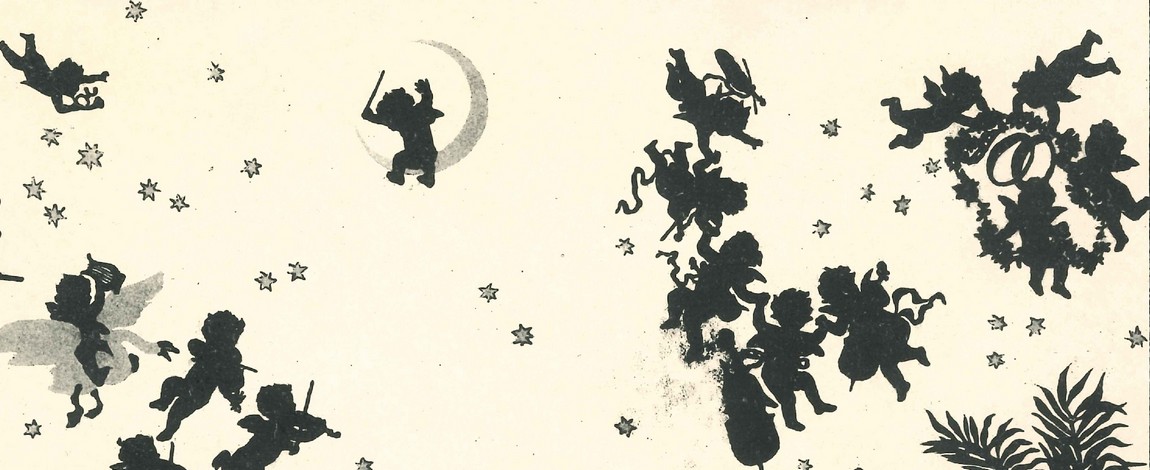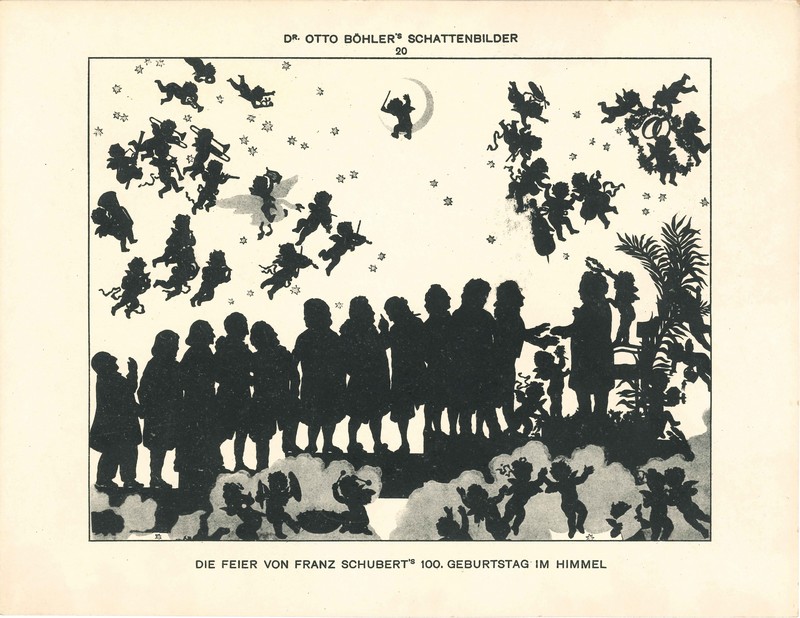At the end of the article I wrote last week, I mentioned Otto Böhler. But before I published, I thought that maybe not everyone would remember him or at least his name. So I quickly added to the text that I would tell you about him, and here it is.
Böhler was born in Frankfurt in 1847, the son of a steel-producing family. Though he was drawn to this field by tradition, he had an interest in painting and studied under Wenzel Ottokar Noltsch, who is most known for his portraits. Eventually, his student would also become famous for portraits, but in a very different way: Otto Böhler focused on silhouettes, a popular technique in his day. In other words, he would take a piece of black paper and scissors, cut out the shape of the person he wanted to show, and then stick the picture on a white background. It was often just one silhouette, but, as we will see, his works sometimes featured many people.
Böhler was a member of musical circles and used to portray composers, always with tenderness and a sense of humour. In 1914, the year following his death, Dr. Otto Böhler's Schattenbilder, a compilation of his portraits, was published; this book contains the works that are still widely reproduced in various media. For example, he portrayed Johannes Brahms, and there are several portraits of Richard Wagner and Anton Bruckner, together and separately, making music or sharing tobacco. He also represented conductors, such as Hans von Bülow, Wagner or Edvard Grieg; among these portraits, Gustav Mahler's is the most well-known; on a single sheet, he appears eighteen times, each with a distinct gesture.
When I talked about Böhler in the last article, I mentioned his “composer heaven” which he painted (at least) three times. Following Bruckner's death in October 1896, the artist depicted the composer ascending to heaven and being greeted by his deceased colleagues. If we know the usual portraits of musicians, we would recognize the shy Bruckner; a little angel pulls the skirts of his tailcoat up to take him to greet Liszt, who is waiting for him with open arms. Wagner follows him closely, and Schubert, Schumann, and Weber, as well as other composers, are situated slightly further back; Bach is performing on the organ. Brahms passed away in April 1897, and Böhler also imagined how he would be received in heaven, with Schumann hugging him, Bruckner about to do the same, Mendelssohn, Schubert, Liszt, and others.
However, the scene I was thinking of a few days ago was Schubert's party for his 100th birthday in January 1797, which is what illustrates this article. What composers do you recognize? The image can be enlarged by clicking on it; you'll find the solution at the end of the article.
Nicolai Gedda, whom I hope will also be granted a grand centenary celebration in heaven, musically illustrates the post. The tenor and Hermann Reutter perform Schubert's Der Schiffer, upon a poem by Johann Mayrhofer. I hope that you enjoy it, and also that are interested in finding more portraits of Otto Böhler.
Im Winde, im Sturme befahr' ich den Fluß,
Die Kleider durchweichet der Regen im Guß;
Ich Ich peitsche die Wellen mit mächtigem Schlag
Erhoffend, erhoffend mir heiteren Tag.
Die Wellen, sie jagen das ächzende Schiff,
Es drohet der Strudel, es drohet der Riff,
Gesteine entkollern den felsigen Höh'n,
Und Tannen erseufzen wie Geistergestöh'n.
So mußte es kommen - ich hab es gewollt,
Ich hasse ein Leben behaglich entrollt;
Und schlängen die Wellen den ächzenden Kahn,
Ich priese doch immer die eigene Bahn.
Drum tose des Wassers ohnmächtiger Zorn,
Dem Herzen entquillet ein seliger Born,
Die Nerven erfrischend - o himmliche Lust!
Dem Sturme zu trotzen mit männlicher Brust.
In wind and storm I traverse the river,
My clothes soaked through with the downpour;
I lash the waves with powerful blows,
Hoping, hoping for a fine day.
The waves, they drive the creaking ship,
The whirlpool threatens, as does the reef.
Rocks roll furiously down from the craggy heights,
And firtrees sigh like lamenting ghosts.
So it must be, and so have I willed it:
I hate a life that unrolls comfortably;
Even were the waves to swallow this creaking boat,
I would still ever praise the path I have chosen!
So let the water roar with impotent rage;
From my heart springs forth a blissful fountain,
Refreshing the nerves - o heavenly joy,
I stand against the tempest with a defiant chest.
(traducció de Salvador Pila)
The birthday celebration of Schubert in heaven: Mozart is the first to congratulate Schubert (who is laureated by an angel); behind him are Beethoven and Gluck; Haydn, who talks to Händel; Bach, who speaks with Wagner and Weber; Liszt, Schumann, and Bruckner.
















Comments powered by CComment